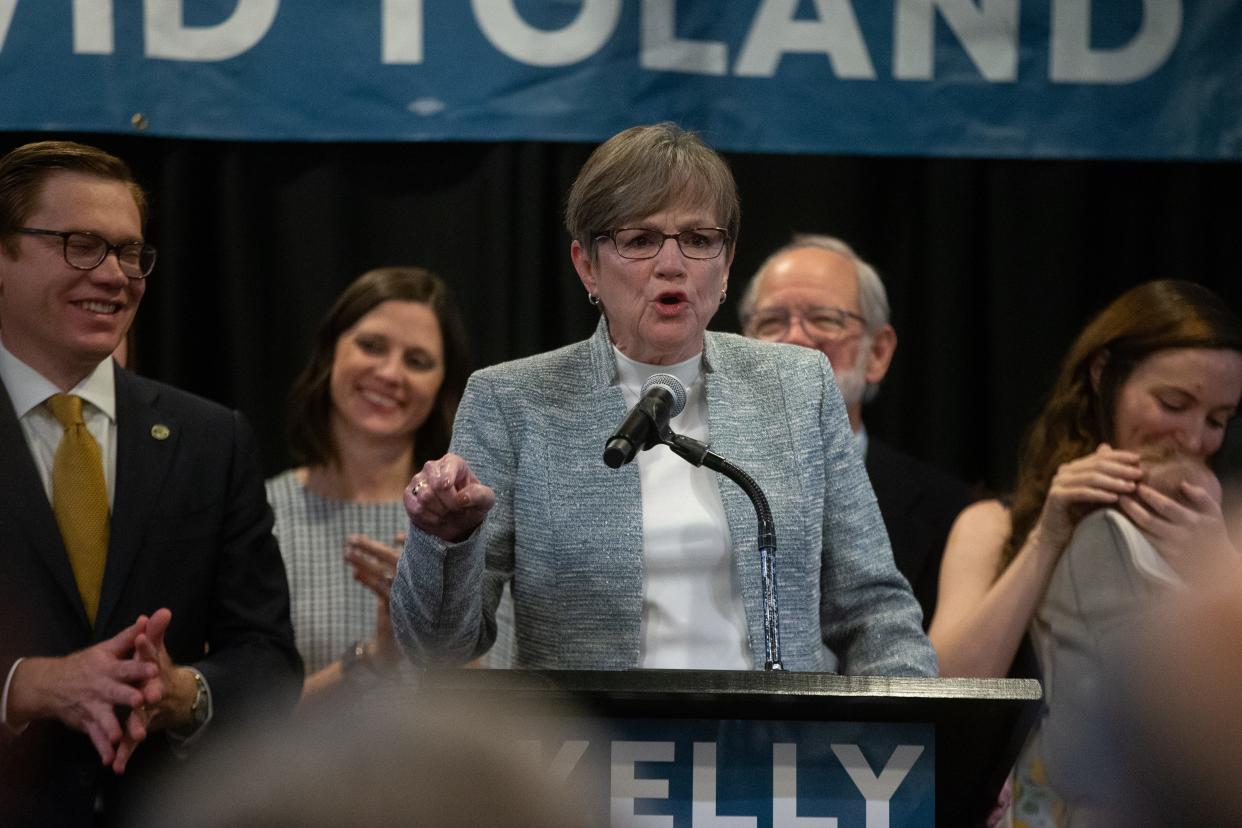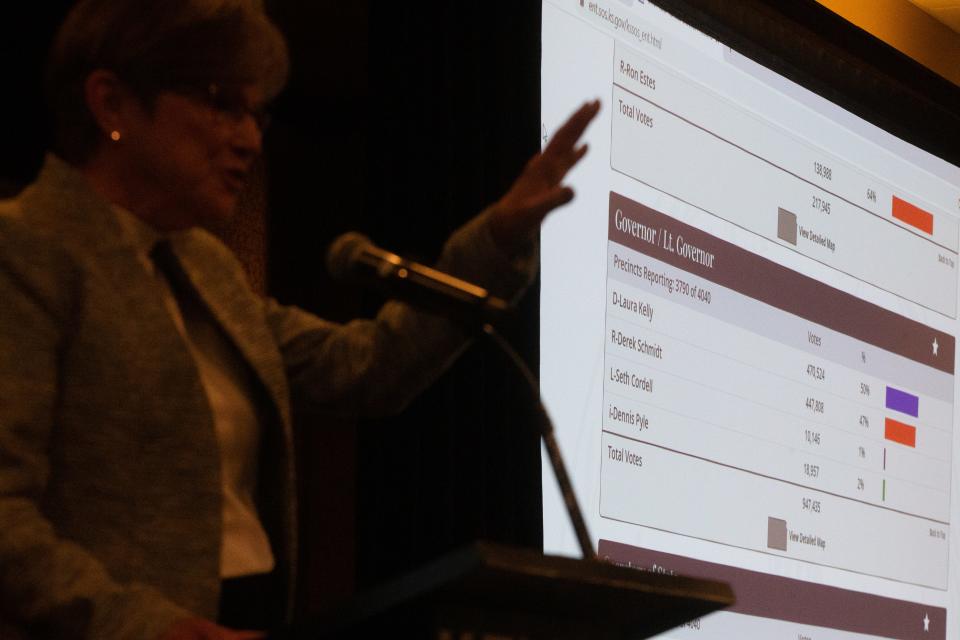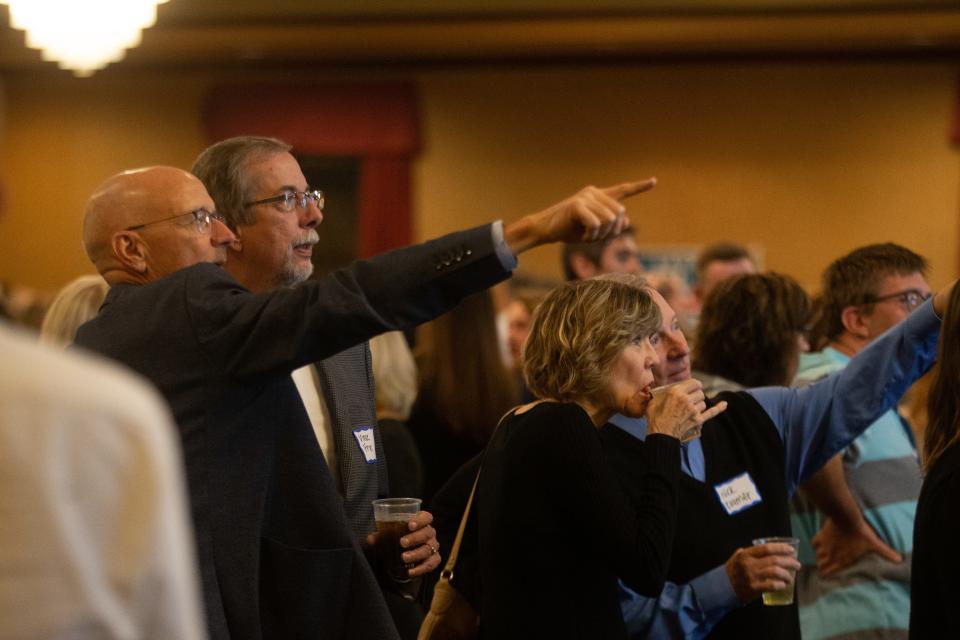Laura Kelly won a second term as Kansas governor. This part of the state was key.

- Oops!Something went wrong.Please try again later.
- Oops!Something went wrong.Please try again later.
- Oops!Something went wrong.Please try again later.
- Oops!Something went wrong.Please try again later.
Every politician has a series of stories they tell as part of their default stump speech and, in the runup to the Nov. 8 election, Gov. Laura Kelly had one that went something like this.
In her first campaign for state Senate in 2004, Kelly defied the advice of her campaign manager to ignore Wabaunsee County, the largely rural and conservative appendage to a district that also included northern Topeka. While presented with arguments that such a move was a waste of time, the governor said at the time that it "just doesn't feel right" to ignore voters there.
The ultimate margin in that race was 39 votes.
On Monday, a day before her reelection battle with Republican Attorney General Derek Schmidt, Kelly returned to knock on doors in Wabaunsee County, proclaiming it her "good luck charm" in narrow elections.
But while every vote did matter given Kelly's razor-thin victory over Schmidt, experts largely say her good luck charm this time around was an area that is the polar opposite of Wabaunsee County: Johnson County and the Kansas City suburbs.
More:Kris Kobach's comeback is complete. What's next for the Kansas attorney general office?
In recent years, the region has been increasingly key for Democrats and that fact was driven home Tuesday night, when U.S. Rep. Sharice Davids, Kansas' lone Democrat in Congress, also won a commanding victory.
Joining her in victory was not just Kelly but also, potentially, a suite of Democrat Statehouse candidates, though some of those races remain too close to call.
Like in 2018, Kelly won a plurality of votes statewide, bolstered by the presence of independent candidate Dennis Pyle and Libertarian Seth Cordell, whose vote totals are roughly double Kelly's 14,000-vote lead.
Still, the results show the durability of long-lasting political changes in the region and cement Johnson County's status as the principal actor in Kansas' political drama.
"That suburban versus rural divide is as vibrant as ever," said Patrick Miller, a professor of political science at the University of Kansas.
Focus on Johnson County and Kansas City area key for Laura Kelly

Democrats believe Kelly delivered a statewide message — one that was well funded in what was almost certainly the most expensive Kansas governor's race in history.
The Democratic Governors Association poured $17 million into the race, on top of Kelly's own campaign and millions from the Kansas Values Institute, a group that does not have to disclose donors and spending as it is a 501 (c)(4) social welfare organization.
Speaking on a press call with reporters Wednesday, Marshall Cohen, political director for the DGA, said the group believed Kelly "had a very, very powerful story to tell" voters.
"This race was never going to be a blowout," Cohen said. "And so ... money well spent to make sure we never took our foot off the gas, invested in governors and candidates we genuinely believed in and believed had a message that would be well received by voters."
Kelly and her allied groups largely monopolized the airwaves in the early part of 2021, promoting her first-term accomplishments and attempting to tie Schmidt to former Gov. Sam Brownback. Schmidt only responded in earnest in the late summer and early fall, supported by ample help from the Republican Governors Association, which spent $11 million over the course of the election cycle.
Kelly's team doubled down on that rhetoric in and around Kansas City, even until the dying days of the election. While Schmidt largely eschewed the Kansas City media market in the waning weeks of the campaign, Kelly and KVI ramped up there and a large chunk of their get-out-the-vote effort centered on the region.
More:Kansas voters keep status quo in U.S. House delegation of one Democrat, three Republicans
"What I was hearing, people were getting tired of the Kelly ads," said Rep. Bill Sutton, R-Gardner. "The folks in my district, they were really hoping to see Derek fight back and we didn't see a lot of that on TV."
Kelly's message largely focused on economic development, including the multibillion-dollar Panasonic electric vehicle plant in DeSoto, as well as education funding, a topic long considered a priority in the suburban Johnson County school districts, and taxes, including a bill she signed to gradually eliminate the state sales tax on food.
Schmidt, meanwhile, discussed at length Kelly's veto of a ban on transgender athletes in women's sports, as well as the need for so-called "parents' bill of rights" legislation and even held a rally centering on those issues with Florida Gov. Ron DeSantis in Olathe.
But Stephanie Sharp, a former moderate Republican legislator and political consultant, said Kelly's core issues were "tailor made" for Johnson County.
"When Johnson County puts you over the top last time, and you need them to put you over the top again? Of course, you look at the county with the highest turnout and the most aversion to the type of Republican that she's running against," Sharp said.
Strong night extends to Sharice Davids win and Kansas House races
At a Shawnee rally in support of Kelly just days before the decisive election, Mike and Linda Pickett said they were somewhat nervous.
The competitiveness of Johnson County in recent years has largely been due to voters like the Picketts. Mike said he was formerly a Republican but was turned off by the direction of the party under former President Donald Trump.
The pair had been out knocking on doors in support of Kelly, something that is not a foreign concept to the couple after they also advocated in opposition of the Aug. 2 abortion amendment, which would have removed state constitutional protections for abortion rights.
Linda Pickett remembers the type of enthusiasm she would encounter on the abortion issues, with one older woman insisting, “I’m not dying until I vote no on this.”
Whether that would remain in the general election, however, was uncertain.
“I’m not sure that has carried through,” Linda Pickett said. “I think a lot of energy was expended on (the amendment campaign).”
Energy in Johnson County was not as noticeably pronounced as in August, when turnout spiked to 56%, an unusually high level of engagement for a primary election because of the constitutional amendment.
More:Kansas Gov. Laura Kelly wins reelection, as Derek Schmidt concedes governor's race
While the final figure will ebb and flow as mail ballots are received by local elections offices and provisional ballots are adjudicated during the county canvasses later this month, turnout in Johnson County was effectively the same as it was during the primary.
Kelly largely didn't talk about abortion, opting to focus her attention elsewhere. U.S. Rep. Davids, however, extensively criticized her opponent, businesswoman Amanda Adkins, for her position on the issue.
Davids' popularity in the district was striking, with her 12-point victory occurring in a district that was more conservative than in the 2020 election, as it added all of Miami, Franklin and Anderson counties and lost part of Kansas City, Kan., the most reliably Democratic part of the district.
While many dismissed a New York Times/Siena College poll that had Davids up 14 points, it wound up nailing her popularity, although Miller said there was little point in attempting to unravel how Kelly and Davids' campaigns may have affected each candidate's vote totals.

"Those voters and the voters of suburban America have changed themselves in the last 20 years, but especially in the last six years," he said. "They've done more to change themselves in response to politics than any candidate has done to change them."
The dynamics stretched even further down ballot. While it is unclear whether Democrats will be able to pick up enough seats to break the Republican supermajority control in the Kansas House, liberals notched unexpected results in Johnson County all the same.
Democrat Dennis Miller holds a nearly 200-vote lead over Rep. Charlotte Esau, R-Olathe, while Democrat Allison Hougland holds an even narrower 90-vote margin over Republican Matt Bingesser in House District 15. Neither race was expected to be competitive for Democrats.
Elsewhere, incumbent Democrat Reps. Heather Meyer, D-Overland Park, and Dan Osman, D-Overland Park, won comfortable reelection races, despite Republicans spending heavily on those races.
And in the race for chair of the Johnson County Commission, a nominally nonpartisan fight, Roeland Park Mayor Mike Kelly handedly won over Republican Charlotte O'Hara.
"Democrats absolutely got out the vote better," said Rep. Stephanie Clayton, D-Overland Park.
More:Kansas voters opt to retain Supreme Court justices, as little opposition emerges
Can Republicans get back on track in Johnson County?
For Republicans, the result will prompt introspection about the party's future in Johnson County and what it means for future statewide elections.
Kelly appears set to win only eight counties in her reelection, one fewer than she captured in her maiden victory in 2018, though Harvey County could flip depending on outstanding advanced mail ballots. She also became the first Democrat to win Geary County since Kathleen Sebelius' 2006 reelection bid.
Her performance in Johnson largely washed out Schmidt improving on the 2018 performance of Kris Kobach, Kelly's then-foe, in Wichita and beyond.
Mike Kuckelman, chair of the Kansas Republican Party, didn't write off the GOP's future in the area but noted he believed Johnson County to be a "purple county."
"We have a lot of work as the Republican Party to do in Johnson County," he said.
The party will be tested, not just with another shot at Davids' seat in 2024 but also in defending several Kansas Senate seats that could be vulnerable in two years.
Sutton, the Gardner representative, said there were no clear answers to the party's struggles in the area on Tuesday night, though he said the ultimate results defied his expectations.
More:Kansas voters amend Constitution on sheriffs; legislative veto remains too close to call
A greater presence from Schmidt in the area might have made a difference, he said, given the slim vote margins. But the results did not necessarily pose an existential crisis.
"I'm not sure I would draw any conclusions about the future of the party from that, necessarily," Sutton said.
Kelly's approval rating statewide paced well ahead of that of President Joe Biden in Kansas, with most polls pegging the governor's support at over 50%.
While Miller, the KU professor, noted some of Schmidt's campaign decisions may be questioned, he said a big part of Kelly's victory ultimately came down to her unique strengths as a candidate.
"Let's not make it look like Derek Schmidt just screwed everything up because the other side of that equation is important, too," he said. "Laura Kelly has been a reasonably popular governor who ran a pretty good race. Let's give her credit."
This article originally appeared on Topeka Capital-Journal: Johnson County key in Gov. Laura Kelly's win in Kansas governor's race

